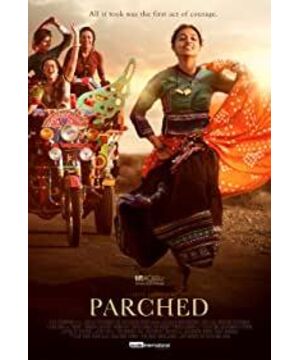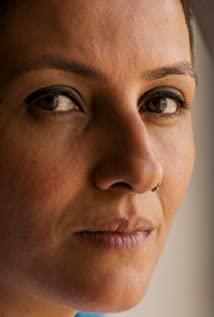This is a more realistic Indian film than "Wrestle, Dad."
The film is less than two hours long, with no standard three-act play structure without intermission, and no sudden singing and dancing clips. It truly shows the cruelty of women's survival in rural India. In this "born a woman, I'm sorry" society, there are always those great women who are unwilling to give up their right to pursue happiness. They are India's "crazy flowers".
I wanted to comment without spoilers, but after thinking about it, I still couldn't find a better perspective, because the story itself is the most powerful voice. No matter how you praise the neatness and appropriate editing of its play, it is better to let more people see the current situation of women's survival under the story.
The story takes place in the countryside of Rajasthan, India. This is exactly what we think of India. Women here are commodities, walking wombs , and their value of existence is to cook, do laundry, and have children. Their whole lives are controlled by men, and their husbands, sons, and elders in the village will have a hard time getting a foothold without men. There are educated women here too, but she is teased by men and women just want to stay away from her.
It's not that no women tried to escape. They fled from their husband's house to their parents' home, but were "trialed" by the elders: after marriage, the parents' home is no longer your home. They were asked to go back to their husband's house, but no one cared whether they went home or not and could only commit suicide in desperation.
The protagonist of the story is called Rani, a widow who has been a living widow for 15 years . She failed to get an education because "girls who read make bad wives." At the age of 14, she married her husband and gave birth to a son. Just one year later, her husband died in an accident. Although her husband had beaten her and betrayed her, she still carried his home without hesitation, raised her paralyzed mother-in-law, and worked hard to raise her son. She is the representative of countless traditional Indian women.
One of her good friends, La Qiao, is enthusiastic, cheerful, carefree, and speaks freely. As long as she is not at home, she is always excited. However, as soon as she got home, she became a submissive and humble "handmaid". Even if she was beaten and kicked by her husband , she just swallowed her voice. As her husband said, she was a useless child who could not conceive . La Qiao endured it, she thought it was her fault, just like other women in the village, she thought that if she couldn't have a daughter, it was a problem of the wife's "land", and it was unheard of for a man to be infertile.
Another good friend, Bikili, is the oiran of the dance troupe in the village, and sometimes she has to sell her body . Perhaps it is because of the sincerity of Rani and La Qiao that she is not ashamed. Even when Rani did not welcome her to her son's wedding, she was generously forgiving. All the women in the village hated her and accused her of seducing their husbands; the men wanted to sleep with her and have their lust on her.
The beginning of the story is the scene where the heroine Rani chooses a wife for her son Gulab. Zhan Qi, a 15-year-old girl, is just a commodity for sale, and she has no right to speak. Her body, appearance, and ability to take care of her family are all evaluation criteria, and her father just wants to sell it for a good price. And Rani, who went bankrupt, bought this daughter-in-law for her son.
Zhan Qi cut off her hair, hoping to prevent the wedding, but not only failed to do so, but also made Gulab ridiculed and announced the beginning of her unfortunate marriage.
The son resented the mother because of the ugly bride, and the mother-in-law died on the son's wedding night, scared to death by the gossip that the ugly bride was. Rani, who had finally become a mother-in-law, vented her anger on her new daughter-in-law.
The prodigal son continued to be lawless, pouring his anger on the husband who was trying to educate the village to change the status quo. Rani paid the prostitution money owed for her, and he still had no remorse.
Although Rani's heart is broken because of her son, and La Qiao is always scarred, they can always comfort each other in friendship.
The scenes that shape the friendship of these women in the film are very warm. La Qiao rushed to Rani's house after being injured, and Rani felt distressed when she applied medicine for her. When La Qiao once again sought Rani's comfort from domestic violence, Zhan Qi held La Qiao's hand for Rani who was not at home. In this village where women are not human, they are the only ones who cherish each other and take care of each other.
The scene of the three women and the girl Zhan Qi in the following scene is particularly important. It is a turning point in the second act. The fate of the three people is foreshadowed here, and the friendship between Rani and Bickley is also facing challenge.
But its charm lies in the voices of these three women
Rani naturally thinks that " without having children, a woman's life is useless ", but she said that " life can't be unfair, we only live a lifetime, and we have to find our own share of happiness ".
La Qiao learned that her husband might be infertile and rekindled her desire to have children . She was not trying to save the marriage, but just " wanted to enjoy the joy of having children and did not want to be hit by fate ."
The creator used Biqili's mouth to express the issue of the right to speak/male writing. The swear words are all words that hurt women, and they shouted together " Go to your son! Go to your uncle! Go to your father! Go! your brother's! "
They all agreed that " who needs a man when your phone vibrates to make you cool! "
With the help of Rani and Bickley, La Qiao gave herself to another man, and she finally became pregnant (a man's is just a tool for providing sperm). Little did she know, however, that her husband knew that he was infertile.
Beachie thought she had found a man who liked her, but found out that he just wanted to be her pimp and treat her as a cash cow.
The unbearable son finally wakes up Rani, Zhan Qi is who she used to be, and history always repeats the same tragedy.
The film's climax uses the classic parallel cut appropriately. The Tokachi Festival and the death of La Qiao's husband reflect each other. It is a celebration of the divine power of women and commemorates the history of Goddess Durga slaughtering the great demon Mashi Falcon. And Rani helped La Qiao ask her husband's bondage.
What constrains Rani and Beachley is actually social etiquette, which is an untouchable illusion. And La Qiao's violent husband is a real existence, a target representing the old system of patriarchy. Therefore, Rani's freedom of her daughter-in-law, Zhan Qi, and cutting off the delusions of her son's prodigal son's return are just the foreshadowing of the climax. Until the arrival of male death, there is real liberation. The raging fire is anger and nirvana.
It is themselves, and together, that save women.
As a female director, Leena Yadav tells a story of struggle in the most tender and optimistic way. The portrayal of Rani's transformation is delicate and clear. With Rani, we feel the survival dilemma of being a woman, and finally follow her to break through. shackles. The male characters in the film are abhorrent, but the director does not angrily vilify the male characters in the film (unlike male directors objectify female characters).
We saw the hypocritical and tyrannical husband of La Qiao, and the hopeless new generation represented by the son of La Ni.
But we also saw the gentleman who risked his life to educate the villagers and provide survival opportunities for the women in the village, the sex tutor who regarded the female body as a holy altar, and the boy who came all the way to find Zhan Qi for love, Saw Shahrukh Khan on the other end of the phone who could be candid with Rani.
The ending of the film is bright, there is no doubt that they are looking forward to a new life with short hair. Yet there are still shadows in the light. Their hometown is still a hopeless hell .
Rani, La Qiao and Bikili all left here; the husband who provided the village women with a chance to survive was beaten to death, and his wife who was running around spreading the new education also chose to leave; the girl Zhan Qi also left.
Undoubtedly, the director is pessimistic about this hopeless village, only waiting for the wheel of history to crush them all.
They are not Nora. Although the future is difficult, there is already a place for them.
Nor are they Thelma and Louis, who are not ahead of a cliff, but an unknown journey.
For more movie recommendations, please pay attention to the WeChat public account: mOco (id: mocointardis) in the blue box.
View more about Parched reviews











